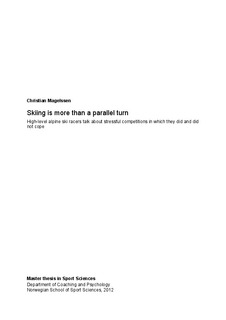| dc.description.abstract | Within the world of elite alpine ski racing, there are numerous examples which show
that skiers’ ability to cope with competitive stress fluctuates. The overall aim of this
thesis was to gain insight into why and what happens when high-level alpine ski racers
cope with competitive stress and why and what happens when they do not. Moreover, to
get insight into the factors which are associated positively and negatively with the
ability to cope with competitive stress. Seven female Scandinavian high-level alpine ski
racers (mean age = 18.6) participated in an Interpretative Phenomenological Analysis
interview (IPA; Smith, Flowers & Larkin, 2009) regarding their ‘lived experiences’
pertaining to one stressful competition in which they coped and one in which they did
not cope. The skiers highlighted a long list of training and preparation variables, team
variables and personal variables which affected their ability to cope positively and
negatively in the respective competitions. Positive training and preparation variables
included successful training sessions and/or races and meeting expectations, whereas
tumbling into a technical, physical or psychological slump and not meeting expectations
were seen as negative training and preparation variables. Positive team variables
included feeling confident in the team, belonging to a high-ability team, having
confidence in one’s team and receiving social support from the coach, whereas feeling
the coach had lost faith in the skier, being exposed to overly controlling coaches and a
lack of teammates’ support were identified as negative variables. Finally, a large
number of personal variables were identified in this study. The variables having a strong
belief in success, possessing high relative competence, being task focused, having high
perception of control and having an unwavering trust in one’s abilities were identified
as positive personal variables. On the other hand, skiing beyond one’s capacity,
possessing a high belief in failure, giving up, pushing too hard and exaggerated
preparations were identified as negative variables. The results of this thesis are
discussed in terms of the Cognitive Activation Theory of Stress (CATS; Eriksen &
Ursin, 2006; Ursin & Eriksen, 2004) as well as a number of other relevant theories. | no_NO |
